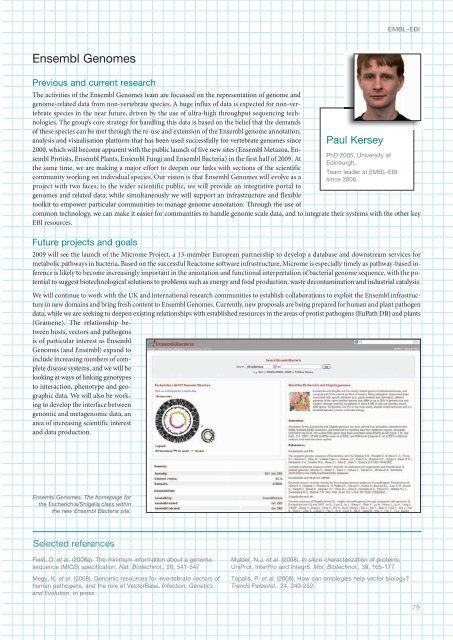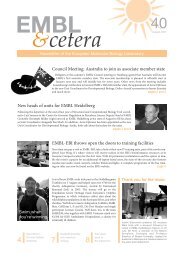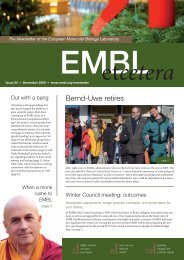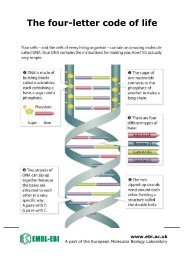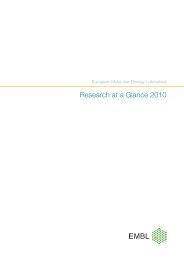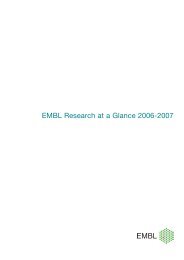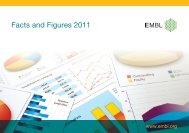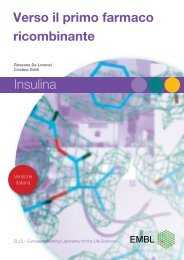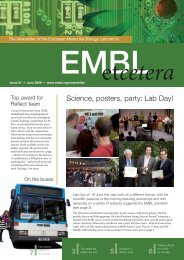Create successful ePaper yourself
Turn your PDF publications into a flip-book with our unique Google optimized e-Paper software.
<strong>EMBL</strong>-EBI<br />
Ensembl Genomes<br />
Previous and current research<br />
The activities of the Ensembl Genomes team are focussed on the representation of genome and<br />
genome-related data from non-vertebrate species. A huge influx of data is expected for non-vertebrate<br />
species in the near future, driven by the use of ultra-high throughput sequencing technologies.<br />
The group’s core strategy for handling this data is based on the belief that the demands<br />
of these species can be met through the re-use and extension of the Ensembl genome annotation,<br />
analysis and visualisation platform that has been used successfully for vertebrate genomes since<br />
2000, which will become apparent with the public launch of five new sites (Ensembl Metazoa, Ensembl<br />
Protists, Ensembl Plants, Ensembl Fungi and Ensembl Bacteria) in the first half of 2009. At<br />
the same time, we are making a major effort to deepen our links with sections of the scientific<br />
community working on individual species. Our vision is that Ensembl Genomes will evolve as a<br />
project with two faces; to the wider scientific public, we will provide an integrative portal to<br />
genomes and related data; while simultaneously we will support an infrastructure and flexible<br />
toolkit to empower particular communities to manage genome annotation. Through the use of<br />
common technology, we can make it easier for communities to handle genome scale data, and to integrate their systems with the other key<br />
EBI resources.<br />
Future projects and goals<br />
Paul Kersey<br />
PhD 2005, University of<br />
Edinburgh.<br />
Team leader at <strong>EMBL</strong>-EBI<br />
since 2008.<br />
2009 will see the launch of the Microme Project, a 13-member European partnership to develop a database and downstream services for<br />
metabolic pathways in bacteria. Based on the successful Reactome software infrastructure, Microme is especially timely as pathway-based inference<br />
is likely to become increasingly important in the annotation and functional interpretation of bacterial genome sequence, with the potential<br />
to suggest biotechnological solutions to problems such as energy and food production, waste decontamination and industrial catalysis.<br />
We will continue to work with the UK and international research communities to establish collaborations to exploit the Ensembl infrastructure<br />
in new domains and bring fresh content to Ensembl Genomes. Currently, new proposals are being prepared for human and plant pathogen<br />
data, while we are seeking to deepen existing relationships with established resources in the areas of protist pathogens (EuPath DB) and plants<br />
(Gramene). The relationship between<br />
hosts, vectors and pathogens<br />
is of particular interest as Ensembl<br />
Genomes (and Ensembl) expand to<br />
include increasing numbers of complete<br />
disease systems, and we will be<br />
looking at ways of linking genotypes<br />
to interaction, phenotype and geographic<br />
data. We will also be working<br />
to develop the interface between<br />
genomic and metagenomic data, an<br />
area of increasing scientific interest<br />
and data production.<br />
Ensembl Genomes. The homepage for<br />
the Escherichia/Shigella class within<br />
the new Ensembl Bacteria site.<br />
Selected references<br />
Field, D. et al. (2008a). The minimum information about a genome<br />
sequence (MIGS) specification. Nat. Biotechnol., 26, 51-57<br />
Megy, K. et al. (2008). Genomic resources for invertebrate vectors of<br />
human pathogens, and the role of VectorBase. Infection, Genetics<br />
and Evolution, in press<br />
Mulder, N.J. et al. (2008). In silico characterization of proteins:<br />
UniProt, InterPro and Integr8. Mol. Biotechnol., 38, 165-177<br />
Topalis, P. et al. (2008). How can ontologies help vector biology?<br />
Trends Parasitol., 2, 29-252<br />
79


